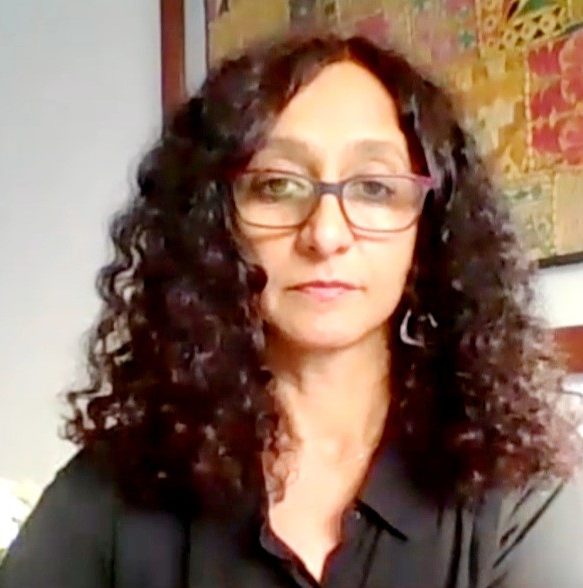
From our participants:
💬 “I’m very grateful for this — VERY. I wasn’t free to attend the live event, but I’ve now watched it at my leisure,” Prof. Andrew Colman, Leicester University.
💬 “One of the best talks I’ve heard.”
💬 “Outstanding session. Very thought provoking.“
💬 “Well done! Bravo! So wonderfully articulated!“
💬 “This is incredibly interesting.“
💬 “This is so wonderful. Looking forward to seeing the discussion.“
💬 “What an excellent thought provoking webinar.“
💬 “Thank you for an excellent webinar. Appreciate it very much – learned a lot.“
Watch the recordings:
00:00 Welcome (Saths Cooper and Craig Calhoun)
Keynote Speech by Stephen Reicher:
04:19 Contrasting and explaining the notions of ‘fragile rationality’ and ‘collective resilience’
17:46 Bringing forward the notion of a ‘collective identity’
23:35 The sense of ‘shared identity’ as a key to understanding 3 aspects of the pandemic
38:46 How to nurture ‘shared identity’ and what undermines it
Discussion among panelists:
45:16 Drawing out elements emphasized in the Keynote Speech (Craig Calhoun)
50:50 The importance of the ‘model of man’ for policy-making (Rifka Weehuizen)
01:00:59 Considering the politics of suffering and the politics of care (Shahnaaz Suffla)
01:11:55 The crucial role of behavioral science for the future (Jay Van Bavel)
01:22:20 Responses and comments on points raised by panelists (Stephen Reicher)
Questions from the audience:
01:34:36 Bringing gender to the forefront of the discussion?
01:39:59 Will shared identity decline after the crisis?
01:43:30 How to see the issue of identity strengthening across rich and poor countries?
01:51:04 How to translate the current analysis into action to improve mental health?
01:55:20 Closing remarks
The webinar addressed the following two questions:
Speakers
Saths Cooper, Welcome
Saths Cooper obtained his PhD in Clinical/Community Psychology from Boston University as a Fulbright scholar in 1989. He is a Deputy Chair of the ISC Committee on Freedom & Responsibility in Science (CFRS), Past President of the International Union of Psychological Science (IUPsyS), President of the Pan-African Psychology Union, Fellow of the Psychological Society of South Africa (PsySSA) and the National Academy of Psychology – India, and Honorary Fellow of the British and Irish Psychological Societies.

Stephen Reicher, Keynote Speaker
Stephen Reicher is Wardlaw Professor of Psychology at the University of St. Andrews. He is a Fellow of the British Academy and a Fellow of the Royal Society of Edinburgh. For over 40 years he has been researching into various aspects of group process and social identity. He is currently on the advisory groups to the UK and Scottish Governments on COVID-19.
Craig Calhoun, Moderator
Craig Calhoun is University Professor of Social Sciences at Arizona State University. Previously, he was Director of the London School of Economics and Political Science (LSE), President of the Berggruen Institute, and President of the Social Science Research Council. His publications address politics, economics, the impact of technology, and social change.

Rifka Weehuizen, Discussant
Rifka Weehuizen is managing director of the University of Strasbourg Institute for Advanced Study (USIAS). She has a master’s degree in Intellectual History, and a PhD in Economics and Psychology, writing her thesis on “Mental Capital”. Her research has focused on the importance of psychological factors in the economy and what this may imply for economic thinking. Over the years she has held various positions in the area of research agenda setting at the national and international level, bringing together representatives from academia and society, to identify leading questions (both academically and societally) in specific areas to help guide research policy and research funding.

Shahnaaz Suffla, Discussant
Shahnaaz Suffla is Associate Professor at the Institute for Social and Health Sciences, University of South Africa. Shahnaaz’s research interests draw from the intersections of decolonial, African, community and peace psychologies, and public health, and are located within liberatory philosophies and epistemologies. Her research interests include a focus on health and well-being interventions in contexts of structural and epistemic violence; participatory engagement as a site of activism, resistance, healing and social change; and Africa-centred approaches to research, knowledge production and training. Shahnaaz is the President-Elect of the Psychological Society of South Africa.

Jay Van Bavel, Discussant
Jay Van Bavel is an Associate Professor of Psychology and Neural Science at New York University. He is the director of the Social Identity & Morality Lab and the author of “The Power of Us: Harnessing Our Shared Identities to Improve Performance, Increase Cooperation, and Promote Social Harmony”. He has spent the last year studying the determinants of collective behavior in the coronavirus pandemic.
South African attendees can request their CPD Certificate for attending the webinar.
Image by Sam Rodriguez